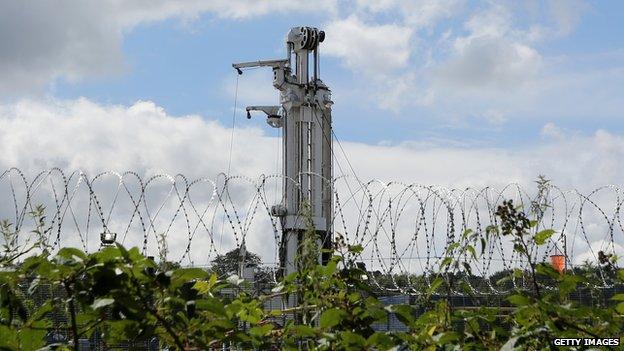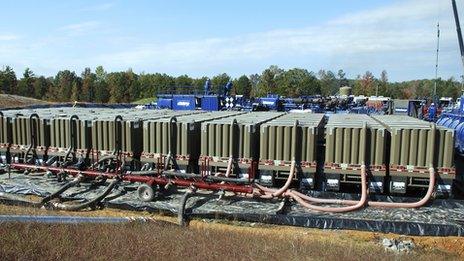Fracking: Water concerns persist?
- Published

Cuadrilla's oil drilling operation in Balcombe has become the focus for anti-fracking protests
Recent studies from the US have again raised questions about the impact of hydraulic fracturing, or fracking, on water supplies.
These show that chemicals, including methane and arsenic, have been found more often in water wells near natural gas extraction sites.
Despite this, the actual causes of the contamination are not clear.
In the UK, water companies say drinking supplies must be protected "at all costs" if fracking becomes commonplace.
Hydraulic fracturing's impact on water is a concern because the gas and oil they aim to extract are normally quite deep in the earth compared with our drinking supplies.
The fracking pipes go through the drinking water aquifers and there are worries that any cracks in the lining of the drilling wells could contaminate supplies.
In their study, external, researchers from the University of Texas in Arlington found increased levels of arsenic in groundwater near fracking sites in the Barnett Shale, an area with around 16,000 active gas wells.
The researchers took samples from 100 private wells and found levels of metals, including arsenic, selenium and strontium that were way above the safe limits for drinking water.
These elements do occur naturally in the region but the authors stated that the drinking wells that exceeded the safety levels were within 3km of a natural gas well, and that these levels got lower and lower the further they sampled from the extraction site.
In short, the wells that were near fracking sites had levels of arsenic around 18 times higher than areas that did not have gas extraction via this technique.
Fluid situation
The scientists also found measurable levels of methanol and ethanol, substances that do not occur naturally in the area.
However, the picture is complicated. The authors believe the metals are not coming from the fracking fluid - the mixture of water, sand and some chemicals used to break apart the shale rocks and release gas and oil.
Rather, they argue that some private water wells that are not maintained have rust on their pipes. Fracking or drilling nearby could dislodge the rust, which is known to contain arsenic.
The presence of ethanol is more difficult to explain. Ethanol is used in fracking fluid. However, the scientists did not compare the chemical signature of the ethanol detected in the drinking water with ethanol in the fluids used in this part of Texas. As a result, they do not have a smoking gun.
Another study carried out , externalat Duke University highlighted the problems of methane contamination in the Marcellus shale basin in Pennsylvania.
The authors found methane in 82% of 141 drinking water wells that they examined in 2011.
In common with the Texas study, the Duke researchers found that water wells closer to gas extraction sites had higher levels of methane. The scientists involved say that in a minority of cases, the methane even had the same chemical signature as the gas being extracted from the ground. They argue these leaks were caused by faulty casings on wells.

Fracking wells consume huge amounts of water which is stored in containers like these before use
However, critics of this study pointed to the fact that the researchers only took samples from locations where people had complained about contamination rather than carrying out random sampling.
Other research, external, though, has done this. The US Geological Survey highlighted two out of 20 randomly selected wells in the same region that had elevated concentrations of methane, but neither was near a gas producing facility.
This could indicate the methane is naturally contaminating ground water supplies and has nothing to do with fracking.
So what does all this mean for water supplies in the UK if fracking goes ahead on the scale the government says is necessary for energy independence and economic growth?
The UK water industry says that there are big differences between the experience of the US and what is likely to happen in Britain.
Knowledge quest
The US had a different geology, different drilling methods and different regulations, said Water UK's Neil Dhot.
"Here, Cuadrilla are talking to us and talking to the utilities in the areas where they are drilling. At the moment, we aren't saying there's a risk to it; we just need to understand if the risks are there or not. We are still at the exploratory stage of all of this."
According to the Department of Energy and Climate Change, the regulations already in place would ensure that any wells drilled for fracking that passed through groundwater supplies would have to be independently verified.
The water industry believes the situation would be improved if companies in the UK that are applying for fracking licences had to compulsorily consult with water utilities. It is not just the concerns about contamination that worry the industry; it is the large amounts of water likely to be needed for the fracking process.
According to the Groundwater Protection Council in the US, every fracked well requires up to 4 million gallons of water (15,000 cubic metres). Given that there could be several thousand wells in the south of England alone, this is a growing concern.
"Particularly in the South East, where water is scarce, we are going to need to plan accordingly - we just need to know how much water we are going to need. At the moment, it is not quite clear," said Neil Dhot.
Follow Matt on Twitter, external.
- Published16 August 2013
- Published16 August 2013
- Published14 August 2013